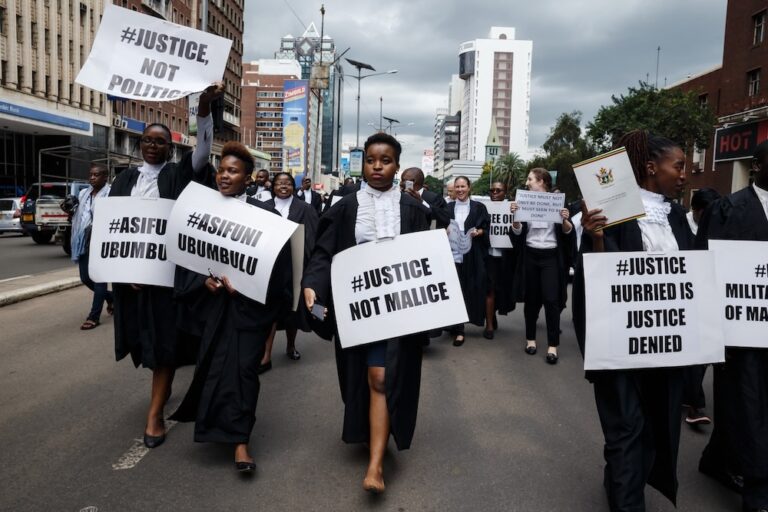(MISA/IFEX) – The minister of information and publicity in the president’s office, Professor Jonathan Moyo, has warned government parastatals against advertising in “The Daily News”. Moyo alleges the newspaper has created a reputation of peddling lies, the state-owned “Herald” reported on Monday 29 April 2002. The minister made these remarks after “The Daily News” published […]
(MISA/IFEX) – The minister of information and publicity in the president’s office, Professor Jonathan Moyo, has warned government parastatals against advertising in “The Daily News”. Moyo alleges the newspaper has created a reputation of peddling lies, the state-owned “Herald” reported on Monday 29 April 2002.
The minister made these remarks after “The Daily News” published an article on 23 April alleging that two young girls had witnessed the beheading of their mother by alleged Zimbabwe African National Union Patriotic Front (ZANU-PF) party supporters in the rural area of Magunje. The story was later picked up and published on the front page of the “Independent” in London, England. In a front page story on 27 April, “The Daily News” apologised to the ruling party, ZANU-PF, and to the government after it was revealed that the victim’s husband might have misled the newspaper.
Moyo said that the government could not allow advertisers to “subsidise” the “destruction” of Zimbabwe through outright lies published by “The Daily News”. He added that this incident was the worst example of what both the government and the public are concerned about. “What is particularly unacceptable and something which must now stop is the fact that there are some government-owned parastatals who advertise in a trash paper like ‘The Daily News’,” Moyo stated.
The minister said that the government could not continue to allow a situation whereby the taxpayers’ money is used to subsidise endless attacks on Zimbabwe. He added that if “the parastatals did not stop the rot on their own,” the government would ensure the law assists them.
Moyo added that, as minister responsible for information and publicity in the president’s office and cabinet, he now realises that the problem does not just concern the “The Daily News”. He lashed out at the owners of “The Daily News”, among them Strive Masiyiwa and Nigel Chanakira. He further added that those who owned and backed “The Daily News” were working for a “common” purpose to discredit the country. He accused Andrew Meldrum and Basildon Peta, both
correspondents for British papers in Zimbabwe, for flashing the story worldwide.
Moyo promised to look at the Access to Information and Protection of Privacy Act to see if it is adequate to deal with “this rot”. He promised to amend the act should it prove inadequate, vowing that no media owner or advertiser would, in his view, be allowed to fund and subsidise the destruction of Zimbabwe.
“The Herald” reports that the police have intensified investigations inside and outside the country to track down the perpetrators who were behind the construction and dissemination of the story. The newspaper reports that the police are also investigating the opposition Movement for Democratic Change (MDC) party’s role in connection with the case.
Background Information
In 2001, the governments of Namibia and Botswana effected similar economic sanctions on privately owned newspapers.
In May, Namibia’s President Nujoma ordered a total ban on the purchase of “The Namibian” newspaper by the government of the Republic of Namibia. The president’s directive was issued hot
on the heels of an earlier cabinet decision to ban government line ministries from advertising in the newspaper on grounds that it maintained an “anti-government stance.”
Also in May, the Botswana government slapped a ban on advertising in the “Botswana Guardian” and “MidWeek Sun” newspapers, because they were too critical of the country’s leaders. The government used this tactic to demonstrate its displeasure over “irresponsible reporting and the
exceeding of editorial freedom.”
However, in September, in what is regarded as a victory for media freedom and freedom of expression, the Botswana High Court declared the ban on advertising in two newspapers unconstitutional. Justice IBK Lesetedi said the advertising ban by the Botswana government on the newspapers violated the newspapers’ constitutional right to “freedom of expression”. “What the government was doing,” said the judge, “was telling the newspapers that if they wanted to continue to enjoy the benefit of receiving advertising from government [they] should conform to a reportage that falls within what it considers to be the parameters of editorial freedom” (see IFEX alerts of 28 September, 16 July, 15 and 14 June, 31 and 30 May and 23 March 2001).


